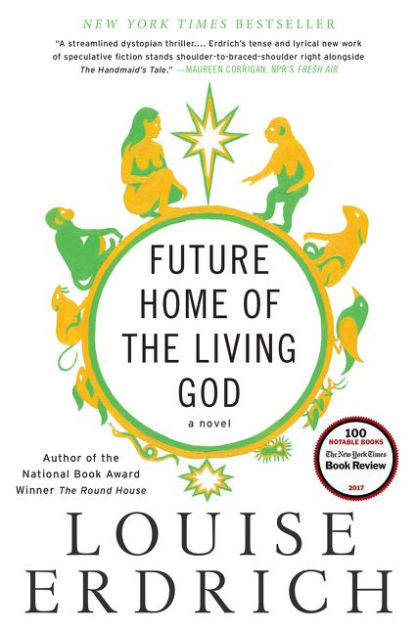Misfiring Chekhov’s phaser

Bringing the Beamers up to speed on some contemporary fiction, we tackled a newer work by an author not known for her science fiction, Louise Erdrich, who posits that evolution could reverse its course and suddenly leave Earth as a vacant lot waiting to become the Future Home of the Living God. Full of saints and sinners, Ms. Erdrich’s novel gave us a lot to ponder, which may not be the best strategy for a writer dealing with a bunch of sharp-eyed readers. Would she build us the house of our dreams, or would she cash our deposits and run off and leave us out in the cold?
Well begun, half done?
Louise Erdrich is a well-respected author whose work draws on her Native American heritage, mingled with her interest in Roman Catholicism. Her first novel, Love Medicine (1984), took a National Book Critics Circle award, while a more recent work, The Night Watchman (2020), won the Pulitzer. She also owns an independent bookstore in Minneapolis. Clearly, a person of great literary merit. Future Home of the Living God (2017) is a stand-alone novel, not connected to her other works, that was inspired by her worries over women’s reproductive rights being restricted as seen in the “gag rules” on US federal funding to non-governmental organizations that promote or provide abortion services. In an interview with Margaret Atwood, Ms. Erdrich acknowledged the influence of The Handmaid’s Tale on her work, both being tales of birthing crises that lead to religiously motivated regimes taking control of pregnancy. Several other sf works, like P. D. James’s The Children of Men and even Ursula Le Guin’s Always Coming Home, were also part of Ms. Erdrich’s background reading for this novel.
Phasers on stun?
Even with such impeccable sf pedigree, does Future Home of the Living God have the right stuff? We had a lot of discussion around that point. One characteristic of sf writing that tends to escape the well-intentioned mainstream author is the task of world-building. Does the fiction do enough work to suspend disbelief? SF readers will expect that a work will provide enough information to put a firm foundation from which to launch its flights of fantasy. Which is a double-edged sword (to keep the ‘fantasy’ metaphor going), because the plethora of details will entail a lot of exposition that must be cleverly introduced and not simply “info-dumped” into the text. Chekhov’s phaser has to be fired precisely.
And we are not too sure that this one was pointed in the right directions, most times. The sweep of evolution reversing gets repeated allusions, many of which captured our attention. But repeatedly, we felt that we were left hanging, waiting for the significance to be revealed or at least given significant respect. Roberto brought up the incident of Cedar, our protagonist, being disturbed by an unseen predator, which turns out to be a saber-toothed feline that feasted on a neighborhood dog. An unsettling incident, no doubt, but never mentioned again. Or the change of street signs to use Biblical citations in place of ordinary names by the “Church of the New Constitution”. Or the mysterious figure of Mother that appears on Cedar’s computer, even when it is unpowered. So much is changing, in the space of Cedar’s pregnancy. For most of us, it seemed to be too much, too fast, at least without more of a sense of the wider world. Though I did like the lizard-chickens that Cedar and her fellow inmates are given to eat in the final prison scenes at the climax.
The very examined life is worth reading?
With its tight focus on Cedar, the book is able to examine her life and beliefs with great, and gentle, care. The opening irony of Cedar Hawk Songmaker being her adoptive name and “Mary Potts” being her Native name was such a winning move that I fell for her right away. John felt a resonance with Cedar’s struggles with understanding her place in the universe, her relationship to God and nature, and her simple human fallibility, which he found warming after several colder, more implausibly perfect protagonists. For those of us who enjoyed the book, it is a character-driven ride through a cozy catastrophe. But it does have some issues with its characters, like the regular mentions of Saint Kateri Tekakwitha, the first Native American to be canonized by the Roman Catholic Church. Alan wanted to know just what the “Lily of the Mohawks” added to the story, as she seems to only be used as a tourist attraction for a money-making shrine.
And where is God? Cedar has a fascination with the Christian concept of the Incarnation, in which the divine enters human existence. Does the divine ever enter the novel? Did we miss it? Based on some Biblical cosplay by Cedar and her lover, Phil, and the birth of her child on December 25, should we infer that we are witnessing the next Nativity of the Lord? Overall, is the reversal of evolution such a disaster? The ending pages of the novel are Cedar’s memories of the last cold winter she remembers, as an 8-year-old out running through the snow. If humanity loses the capacity to use technology beyond hand tools, maybe the snows will return.
Plot points vs. holes
Aside from the strong focus on character, the book does have a weakness in its plotting. Fran was bemused at two late-pregnancy women making a Mission: Impossible escape by climbing down several stories on hand-woven ropes. And worse, Cedar’s travels and troubles were slowly paced (perhaps befitting her gravid state). Alan did not see any progress in the action of the novel, finding it stuck in place, or meandering at best. Penn, a fan of Ms. Erdrich’s other works, admired the quality of the writing but admitted to finding a fair number of holes in the plot. There were several of her books that he would recommend ahead of Future Home.
Could we recommend Future Home of the Living God, on its own? In general, our expectations as science fiction readers were probably higher than this work could, or would, want to reach. John was happy to give it the honor of comparison to Ursula Le Guin’s anthropological work, Always Coming Home, and awarded the book a ‘9’. Kathy, missing the meeting but sending in her comments, did love the book and would have granted it an ‘8’. I enjoyed much of the theological discussion that Cedar, publisher of a Catholic zine and believer in a suffering God, adds to her diary, so I was good with a ‘7’. Chris, who missed much of the meeting due to a wonky video call connection, compared the book to Ms. Atwood’s The Handmaid’s Tale (a recent re-read), but was less confused by the latter and so went with ‘6’ for the Erdrich offering. The rest of us were similarly nonplussed, so a scattering of middle numbers (5, 6, 7) were given. Still, there was a good deal of interest in finding another one of Ms. Erdrich’s works that would fit our speculative fiction agenda. But it seems that we are likely to scanning the listings for a more suitable dwelling.
- Posted in: Meeting Notes
- Tagged: Future Home of the Living God, Louise Erdrich, Science Fantasy

2 Comments
Trackbacks